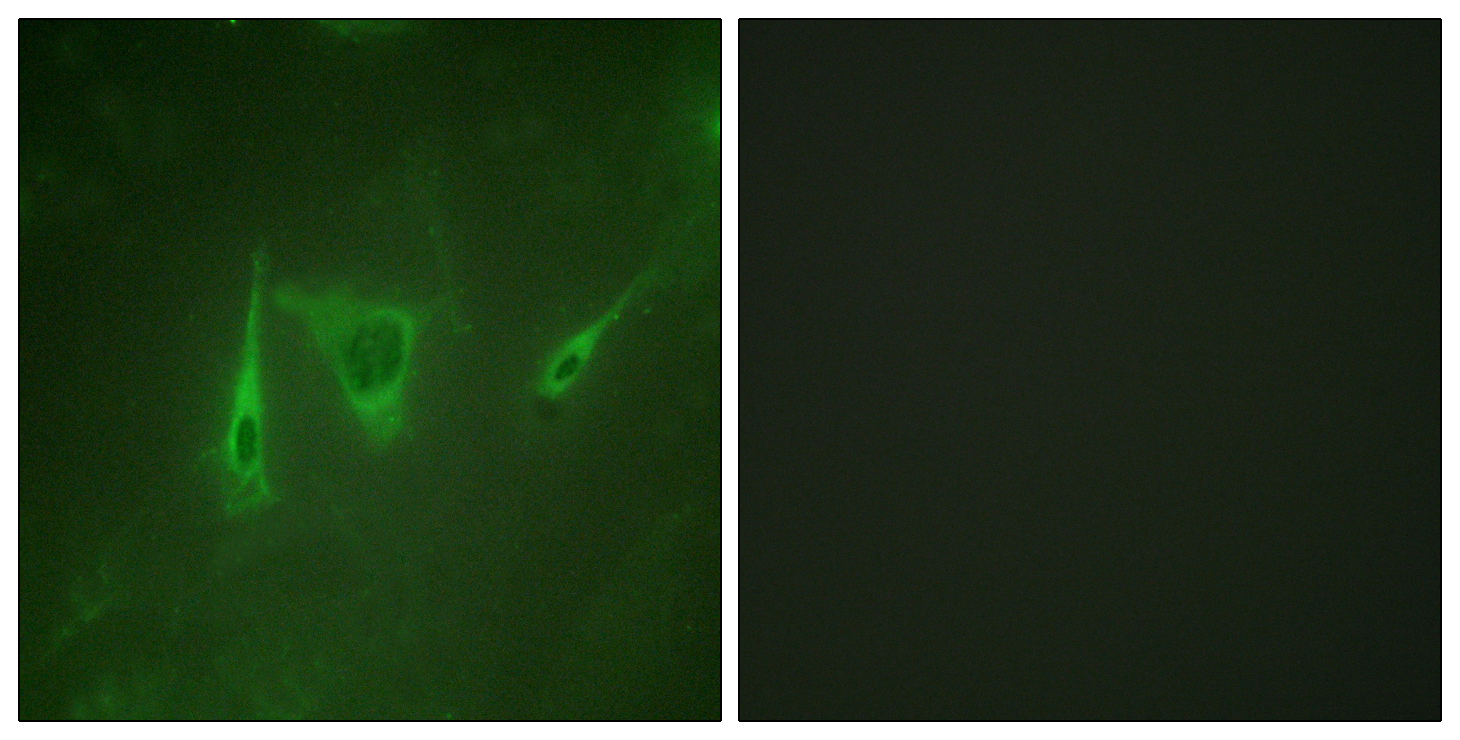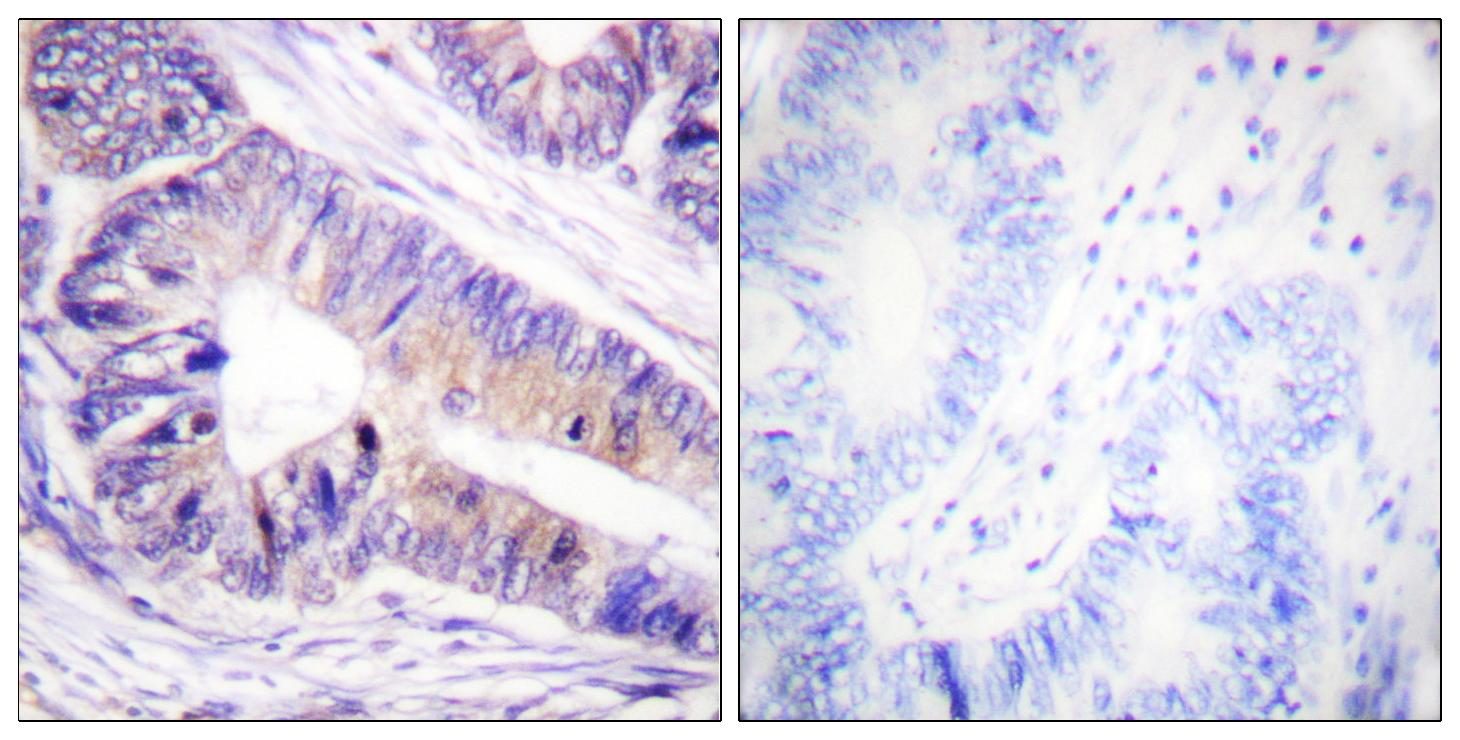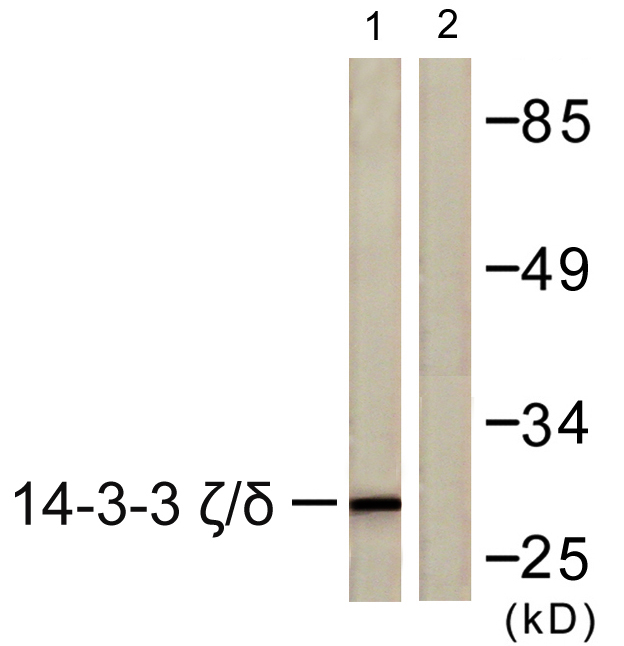14-3-3 ζ/δ Polyclonal Antibody
- Catalog No.:YT0008
- Applications:WB;IHC;IF;ELISA
- Reactivity:Human;Mouse;Rat
- Target:
- 14-3-3 ζ/δ
- Fields:
- >>Cell cycle;>>Oocyte meiosis;>>PI3K-Akt signaling pathway;>>Hippo signaling pathway;>>Hepatitis C;>>Hepatitis B;>>Viral carcinogenesis
- Gene Name:
- YWHAZ
- Protein Name:
- 14-3-3 protein zeta/delta
- Human Gene Id:
- 7534
- Human Swiss Prot No:
- P63104
- Mouse Gene Id:
- 22631
- Mouse Swiss Prot No:
- P63101
- Rat Gene Id:
- 25578
- Rat Swiss Prot No:
- P63102
- Immunogen:
- The antiserum was produced against synthesized peptide derived from human 14-3-3 zeta/delta. AA range:196-245
- Specificity:
- 14-3-3 ζ/δ Polyclonal Antibody detects endogenous levels of 14-3-3 ζ/δ protein.
- Formulation:
- Liquid in PBS containing 50% glycerol, 0.5% BSA and 0.02% sodium azide.
- Source:
- Polyclonal, Rabbit,IgG
- Dilution:
- WB 1:500 - 1:2000. IHC 1:100 - 1:300. IF 1:200 - 1:1000. ELISA: 1:10000. Not yet tested in other applications.
- Purification:
- The antibody was affinity-purified from rabbit antiserum by affinity-chromatography using epitope-specific immunogen.
- Concentration:
- 1 mg/ml
- Storage Stability:
- -15°C to -25°C/1 year(Do not lower than -25°C)
- Other Name:
- YWHAZ;14-3-3 protein zeta/delta;Protein kinase C inhibitor protein 1;KCIP-1
- Observed Band(KD):
- 28kD
- Background:
- This gene product belongs to the 14-3-3 family of proteins which mediate signal transduction by binding to phosphoserine-containing proteins. This highly conserved protein family is found in both plants and mammals, and this protein is 99% identical to the mouse, rat and sheep orthologs. The encoded protein interacts with IRS1 protein, suggesting a role in regulating insulin sensitivity. Several transcript variants that differ in the 5' UTR but that encode the same protein have been identified for this gene. [provided by RefSeq, Oct 2008],
- Function:
- caution:Was originally (PubMed:1577711) thought to have phospholipase A2 activity.,function:Adapter protein implicated in the regulation of a large spectrum of both general and specialized signaling pathway. Binds to a large number of partners, usually by recognition of a phosphoserine or phosphothreonine motif. Binding generally results in the modulation of the activity of the binding partner.,PTM:The delta, brain-specific form differs from the zeta form in being phosphorylated (By similarity). Phosphorylation on Ser-184 by MAPK8; promotes dissociation of BAX and translocation of BAX to mitochondria. Phosphorylation on Ser-58 by PKA; disrupts homodimerization and heterodimerization with YHAE and TP53. This phosphorylation appears to be activated by sphingosine. Phosphorylation on Thr-232; inhibits binding of RAF1.,similarity:Belongs to the 14-3-3 family.,subcellular location:Located to
- Subcellular Location:
- Cytoplasm . Melanosome . Located to stage I to stage IV melanosomes.
- Expression:
- B-cell lymphoma,Bone marrow
- June 19-2018
- WESTERN IMMUNOBLOTTING PROTOCOL
- June 19-2018
- IMMUNOHISTOCHEMISTRY-PARAFFIN PROTOCOL
- June 19-2018
- IMMUNOFLUORESCENCE PROTOCOL
- September 08-2020
- FLOW-CYTOMEYRT-PROTOCOL
- May 20-2022
- Cell-Based ELISA│解您多样本WB检测之困扰
- July 13-2018
- CELL-BASED-ELISA-PROTOCOL-FOR-ACETYL-PROTEIN
- July 13-2018
- CELL-BASED-ELISA-PROTOCOL-FOR-PHOSPHO-PROTEIN
- July 13-2018
- Antibody-FAQs
- Products Images

- Immunofluorescence analysis of NIH/3T3 cells, using 14-3-3 zeta/delta Antibody. The picture on the right is blocked with the synthesized peptide.

- Immunohistochemistry analysis of paraffin-embedded human colon carcinoma tissue, using 14-3-3 zeta/delta Antibody. The picture on the right is blocked with the synthesized peptide.

- Western blot analysis of lysates from K562 cells, using 14-3-3 zeta/delta Antibody. The lane on the right is blocked with the synthesized peptide.



